![]() 1st Battalion 22nd Infantry
1st Battalion 22nd Infantry ![]()
Alfred C. Sharpe
Twenty-five years with the 22nd Infantry
1876-1901
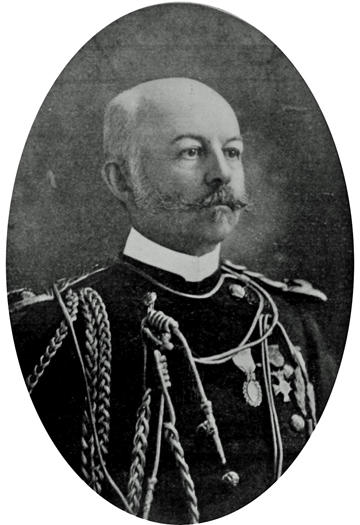
Alfred C. Sharpe
Photo from The Midwestern August 1907
Alfred Clarence Sharpe was born
in Delaware, Ohio on September 12, 1850. He was descended from
Horatio Sharpe,
an early settler of Maryland and Provincial Govenor of Maryland
in the 1750's. His maternal grandfather was
Captain Nicholas Snider, who was the Adjutant of the 3rd Maryland
Regiment of Volunteers during the War of 1812
and who subsequently became the U.S. Marshall of Maryland.
Sharpe's family moved to Iowa
while he was still a boy, and it was from Iowa that he was
appointed to the
US Military Academy, at the age of twenty-one, on July 1, 1872.
His grades at the Academy were about average,
though he earned more than his share of demerits, and in his
third year he was ranked 31 out of a class of 61 cadets.
He resigned from the Military Academy at the end of his third
year, on June 29, 1875, because of a severe injury
he suffered during Cavalry drill, which necessitated a
"protracted course of special surgical treatment." 1
On June 21, 1876 he was offered
a commission as a 2nd Lieutenant in the US 10th Cavalry, a
position which he accepted
on July 26, 1876. Two days later he transferred to the US 22nd
Infantry. He served in the field in Montana under the commands
of Lieutenant Colonel E. S. Otis (22nd Infantry) and Colonel
Nelson Miles, during the fall and winter campaigns (1876) against
the Sioux and Cheyenne under Crazy Horse and Sitting Bull.
On October 10, 1876 Sharpe was
with Company C 22nd Infantry, escorting a wagon train of supplies
from the camp
at Glendive, along the Yellowstone River, trying to reach the
encampment of Colonel Miles, whose cantonment was
at the junction of the Yellowstone and Tongue Rivers. Several
creeks had to be passed before arriving at the Tongue
River camp, one large enough to be called a river. As the wagon
train crossed the first of these creeks, named
Spring Creek, they were harried by hundreds of hostiles. Over the
course of two days many of the mule teams for the wagons
were either killed or stampeded off by the Sioux, and the command
was forced to quit the journey and return to Glendive.
On October 14 the escort was
increased by several more Companies of Infantry, along with three
Gatling guns, and a new wagon train
set out in the attempt to reach Miles' camp. Three Companies of
the 22nd Infantry, augmented by two Companies of the
17th Infantry now made up the escort, the force totalling some
eleven officers and 185 enlisted men. The first day was met
with light resistance by the Sioux, but on the second day the
warriors attacked in force. The wagon train was never stopped.
As the Sioux attacked from various directions, detachments of the
Infantry Companies were sent out to drive them back.
When the hostiles retreated, the Infantry would join up with the
train and continue the march. This back and forth kind of fight
continued all day, across valleys and hills, with the Sioux
setting fire to the prairie grass at different times, while the
wagon train
and its escort fought and continued the march through smoke, and,
at times, intense heat. An estimated 300-400 hostiles continued
the attack for some twelve hours. Sharpe, this time with Company
G 22nd Infantry, led a detachment of ten men, took a hill,
and regrouped with the train, only to rush out again and again to
force the Sioux from yet another hill. The running battle
kept on for a distance of about sixteen miles, and during the
fight the little command expended some six thousand rounds
at their enemy. Over the course of those sixteen miles, the
command had traversed all of the creeks flowing into the
Yellowstone,
which gave cause for this fight to be called by several names,
including the "battle of Spring Creek", the
"battle of Clear Creek",
and the "battle of Cedar Creek". As daylight faded, the
hostiles retreated from the field, and the wagon train camped for
the night.
The next day the wagon train experienced minor skirmishing with
the Sioux, and later in the day was met by an advance guard
from Colonel Miles' camp. The rest of the journey was uneventful.
For his actions during the first
aborted attempt and the second successful journey, Sharpe was
recommended for a Brevet promotion
to 1st Lieutenant by his immediate Commander, COL Elwell S. Otis,
for "conspicuous bravery and fearless exposure.....
in actions against hostile Sioux Indians near Clear Creek, Mont.,
Oct. 15 and 16,'76". 1
(The Brevet did not appear in his records until February 27, 1890.)
For Sharpe's own written account of the above battles, click on the following link to visit the page on this website entitled:
The 22nd Infantry at Spring Creek, October 1876
|
A pencil sketch of
Sketch believed to be by |
In May 1877 Sharpe took part in
the fighting against Lame Deer, along Muddy Creek, Montana. He
was with the Regiment
when it was sent to Chicago in July 1877 for duty in the labor
riots, and again at Wilkesbarre, Pennsylvania for duty during
the mining riots in the fall of 1877. In 1878-1879 Sharpe was
stationed at Fort Wayne, Detroit, and while there he studied law.
He was examined and admitted to the Bar by the Supreme Court of
Michigan on April 17, 1879.
During the years 1879-1881
Sharpe was assigned to Company H 22nd Infantry. He was with
Company H and on detached duty
during those years at Forts McKavett, Clark and Griffin, all in
Texas. In 1880-1881 he was the Post Adjutant at Fort Griffin,
and actually commanded the Post for a time during 1880. On June
30, 1881 Sharpe received a promotion to 1st Lieutenant.
He was then assigned to Company I, 22nd Infantry and became that
Company's Commanding Officer 1881-1882. He would remain
assigned to Company I from 1882-1890. In 1883 he was on detached
duty at Fort Lyon, Colorado, where he occupied the positions
of Acting Commissary of Subsistence and Acting Assistant
Quartermaster.
During the years 1884-1888
Sharpe was a Professor of Military Science and Tactics at Wooster
University in Ohio. He was originally
allowed to teach there by the Army for two years. However, as the
following telegram from the Army's Adjutant General to the
President of Wooster University shows, Sharpe was further
authorized to remain at the University until the middle of 1888:
----------------------------------------------------------------WAR DEP'T, ADJ'T GENL'S OFFICE,
---------------------------------------------------------------------WASHINGTON, Dec 23, 1886
The President of the
University of Wooster, Wooster, Ohio.---------------------------------------------------
Sir,--I have the honor to inform you that, as a recognition
of the success of First Lieut. Alfred C.
Sharpe, 22d Infantry, as Professor of Military Science and
Tactics at the University of Wooster, as shown
by the report of Colonel Roger Jones, Inspector General, the
Secretary of War authorizes the retention
of that officer on duty at the University until July 1, 1888.----------------------------------------------
Very respectfully, Your Obedient Servant,
-----------------------------------------------------------------------------R. C. Drum, Adjutant General.
During his tenure at Wooster
University, Sharpe was awarded the Gold Medal by The Military
Service Institution
of the United States in 1887 for his essay " Organization
and Training of a National Reserve for Military Service."
Members of the Board of Award were General Henry W. Slocum, New
York; Governor John B Gordon,
Georgia; and Governor John F. Hartranft, Pennsylvania.
To read Lieutenant Sharpe's
prize essay (33 pages), click on the Military Service Institution
logo immediately below.
(The link is to a PDF file. To return to this page, click on the
"back arrow" in the file.)
Sharpe was also appointed
Inspector of the Ohio National Guard for the years 1887-1888, and
was the Acting Assistant
Adjutant General on the staff of Ohio Governor Joseph B. Foraker
in 1888. He rejoined Company I of the 22nd Infantry
at Fort Abraham Lincoln, North Dakota in 1888, becoming its
Company Commander in 1889, and served with his Company there
through 1890. In 1889 the Post Graduate Department of Wooster
University conferred upon Sharpe the degree of Master of Arts.
In 1891 he was assigned to Company A 22nd Infantry at Fort Keogh,
Montana, serving with that Company for the next two years.
On February 1, 1893 Sharpe was promoted to Captain and assigned
to Company K 22nd Infantry. He would be officially assigned
to Company K through 1897, however, on February 8 1893 he was
named Acting Judge Advocate of the Arizona Territory
and Colorado, and occupied that position during the years
1893-1897.
|
Article from the Los
Angeles Herald At that time, the Department of
Arizona This part of the article give
information |
In 1898 Sharpe was given command
of Company A 22nd Infantry, and brought the Company with the
Regiment to Tampa,
Florida, in preparation for the invasion of Cuba. On May 12,
1898, before the Regiment left for Cuba, Sharpe was offered the
position of Assistant Adjutant General of 1st Division, 5th Army
Corps, which he accepted on May 30, 1898. The position gave him
the temporary rank of Major of Volunteers. He was honorably
discharged from the Volunteers on April 17, 1899 and the same day
was offered the temporary rank of Major in the Inspector
General's Department, a position which he accepted on April 24.
In that capacity he served as the Acting Judge-Advocate of the
Department of Puerto Rico, during the reconstruction
of that country following the Spanish-American War 1899-1900.
Immediately below is the general order appointing Sharpe to this position (in Section II) :
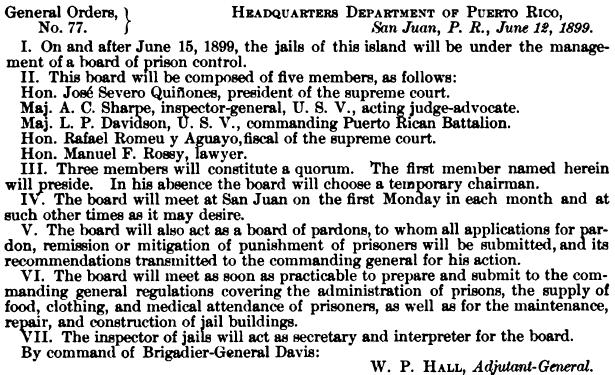
For their annual rifle
competition of 1900, the Ohio National Guard named their
temporary rifle range set up at the
State Camp Ground at Newark, Ohio, in honor of Sharpe. During the
month of October, 1900, the rifle range was
officially called Camp Alfred C. Sharpe, and shooters competed
there for positions on the Ohio National Guard Team.
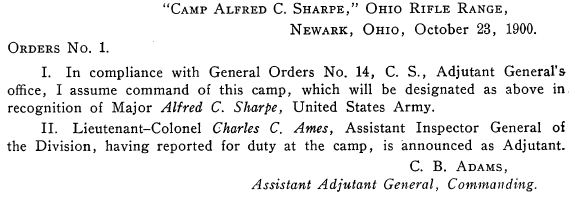
Above: Ohio National Guard orders naming Camp Alfred C. Sharpe
In 1901 Sharpe was assigned to
Company D 22nd Infantry. He was promoted to Major on February 2,
1901, vacating his position
with the Inspector General's Department. On February 28, 1901
Sharpe was appointed to the Adjutant General's Department of the
Army, ending twenty-five years of service with the 22nd Infantry.
He would remain in the position of Assistant Adjutant General
from 1901-1905, being promoted to Lieutenant Colonel of Infantry
on March 29, 1904. On March 8, 1905 he vacated his position
as Assistant Adjutant General and on March 16 of that year was
assigned to the 30th Infantry. In 1905 the University of South
Dakota
conferred upon Sharpe the degree of Doctor of Law. In 1906 Sharpe
was detailed as Inspector of the Arkansas State Militia.
From June 27 through September
12, 1907 Sharpe was detailed as a member of the Army's General
Staff, a position
which is listed in his record as an award, in the same manner as
his Brevet promotion.
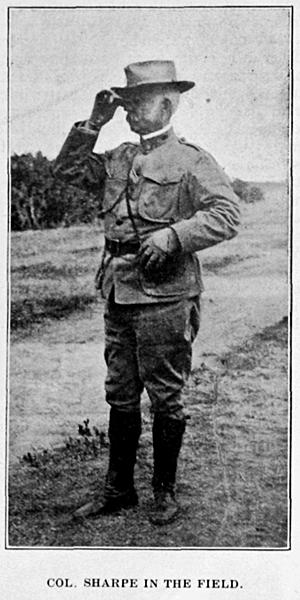
Photo from The Midwestern August 1907
Sharpe remained with the 30th
Infantry until May 9, 1908, when he was promoted to Colonel and
given command
of the 23rd Infantry. He took the 23rd Infantry to the
Philippines for its third tour of duty in that theater 1908-1910.
While in the Philippines he also occupied the position of
Commander of the District of Zamboanga on Mindanao 1908-1909,
and Commander of the Post of Parang, Mindanao, 1909-1910. Sharpe
brought the 23rd Infantry back to the United States
in March of 1910, and, assumed command of Fort Bliss, Texas on
April 24, 1910. He commanded the Army's Patrol District
of El Paso during the first half of 1911, while the Madero
revolution was taking place in Mexico, and border tensions
between Mexico and the United States were a cause for increased
troop levels on the border.
A month after Sharpe assumed
command of Fort Bliss the El Paso Herald ran the
following article about him on its front page:
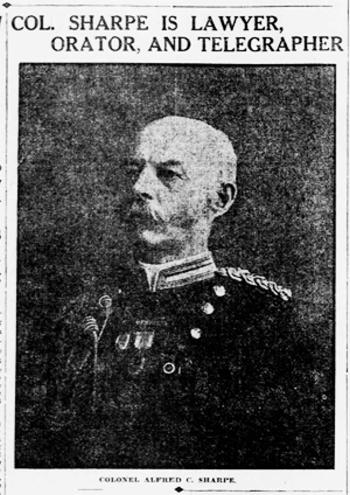
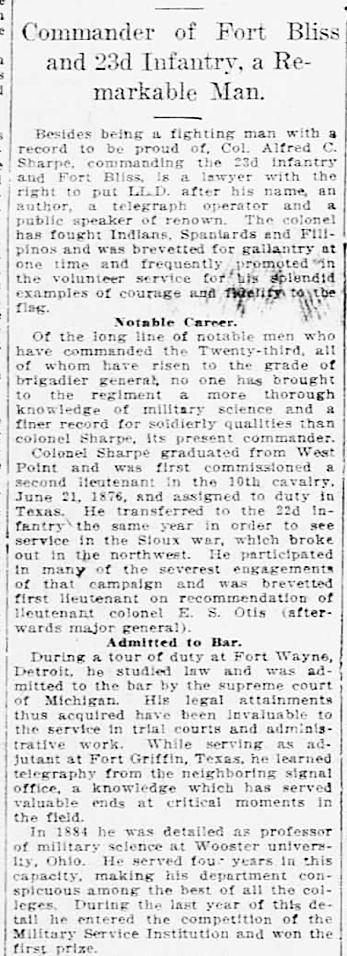
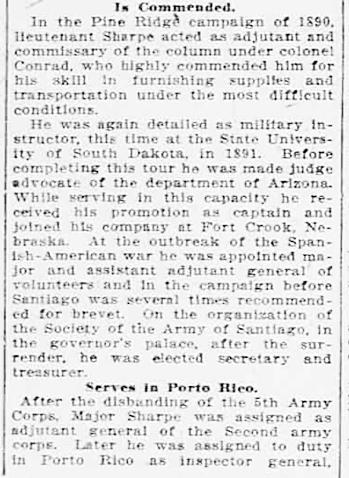
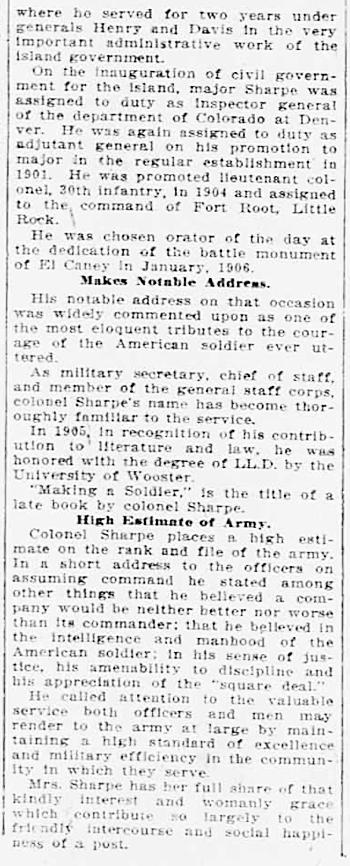
Article from the El Paso
Herald May 28, 1910
From the Library
of Congress Chronicling America
On June 1, 1911 Sharpe
relinquished command of the 23rd Infantry and became a Colonel of
Infantry unassigned
to any Regiment. He remained in that capacity until September 12,
1914, when he was retired from the Army
by Operation of Law for reaching maximum service time. Upon his
retirement Alfred C. Sharpe had served
forty-two years in the Army, twenty-five of those with the 22nd
Infantry. He retired to California, where in 1915
he became a member of the Redlands Fortnightly Club, a literary
society. He died in Palo Alto, California
on January 26, 1923.
Alfred C. Sharpe was a member of The General Society Sons of the Revolution
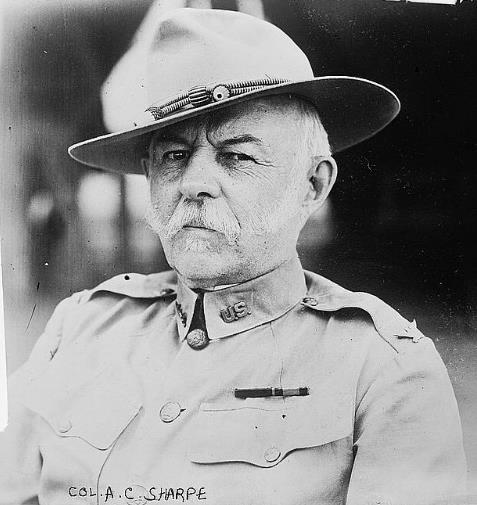
Colonel Alfred C. Sharpe, between 1910
and 1915.
This photo and the photo below were taken at Camp Perry, Ohio.
Note he is wearing his campaign hat creased "fore and
aft" in the older style,
rather than the "Montana peak" style used by the Army
after 1910.
On his left breast are the ribbons for his Indian Wars Campaign
Medal
and Spanish War Campaign Medal, both of which he earned
as a member of the 22nd Infantry.
Photo from the Library of Congress
Alfred C. Sharpe was a prolific
writer on military issues. His writings appeared in the journals
of the Military Sevice Institution,
and in various other publications. He was a great champion of the
cause for maintaining a trained military reserve force,
which could be called upon in time of war, to quickly augment the
small standing Army. Should the nation find itself at war,
this reserve force would constitute a trained and prepared force,
which could immediately be mobilized, to serve the interests
of the nation, thereby eliminating the delay that raising an Army
through conscription and volunteering would cause.
In the August 1907 issue of The
Midwestern magazine, Sharpe wrote an article about the
upcoming manuevers to be held in Iowa,
in which elements of various States' National Guards were to
participate. In the article, Sharpe gives his praise of the
nation's
National Guards, as part of the trained military reserve force he
saw as neccesary to the defense of the Unnited States.
He also briefly mentions the new rilfe range being built in Ohio,
which would come to be called Camp Perry, and which,
over a hundred years later, stills exists as the site of the
United States National Shooting competitions.
The article was prefaced by this description of Sharpe:
One of the most
distinguished men of the United States army, and who has passed
from cadet at West Point to the highest place
that can be reached by military merit, is Colonel Alfred C.
Sharpe, of Iowa. Colonel Sharpe has just been named by President
Roosevelt as a member of the general staff corps. He will
probably be assigned to duty in Manila as chief of staff of the
entire
Philippine division. At the present time he is on detail with the
Ohio National Guard. An effort was made to secure Colonel Sharpe
for the Iowa encampment, but Governor Foraker was ahead of Iowa
and he was thus detailed to Ohio. He has just returned from
Cuba, where he was sent at the personal request of Governor
Magoon, who, knowing of Colonel Sharpe's great service in the
reconstruction of Porto Rico, desired his aid during the past
season. Colonel Sharpe is of an old and distinguished family,
descended from the Sharpes of Maryland and the Thomsons of
Pennsylvania. His father at the beginning of our troubles
removed to Ohio, where Colonel Sharpe was born. When a young boy
he came to Iowa to reside with a sister in Oskaloosa.
Dr. R. A. McAyeal was the sister's husband and he personally
superintended the boy's education and when he was about
twenty, succeeded in securing his appointment to West Point.
Colonel Sharpe's promotions have been on the ground of merit.
He has proved himself well worthy of every honor that has been
bestowed. He has studied and been examined in law, medicine
and has become an expert civil engineer, along with his military
duties. He is a brilliant man of letters, and has been a
contributor
to military journals both in this and foreign countries. In
military tactics he is an expert, and his articles along these
lines have
won him medals over competitors from all over the world. Colonel
Sharpe is certainly a man who has done credit to Iowa,
where he grew to manhood and from which state he received his
appointment to West Point. We present in this issue of
The Midwestern an article from his pen.
The following is Sharpe's article from the 1907 Midwestern:
FOR the first
time in her history Iowa will this year essay the high emprise of
military maneuvers, and the eyes, not only
of the War Department at Washington, but of all the National
Guard of all the other forty-four states of this great Union
will be turned with interest upon her. Nay, if this fever for
military training, this ambition to qualify practically and under
scientific leaders in the art of national defense, which seems to
be spreading and possessing our young men, shall continue
to grow and find expression in these annual field exercises, we
expect the eyes of all Europe and even of far away Japan
will be gazing earnestly and inquiringly towards us. It is
fortunate that our people are at last arriving at a realization
of our
position in the world and coming to understand the obligations
which it imposes. For nearly a century our statesmen
have proclaimed our adherence to the Monroe Doctrine, but as no
one has ever had occasion to contest it, we have been
lulled into the belief that no one would dare to do so. Drifting
along in this fancied security we were still further fortified
in our conceit by having at hand thirty thousand veterans to
throw forward to the Rio Grande when Maximilian made
his unhappy attempt in Mexico. And so we came on down to the
Spanish war where, wretchedly unprepared in spite
of the warnings which military and naval students had been
voicing for years, we were compelled to launch into a dubious
campaign across the sea—although we did not own a single
transport and some of our troops were still firing black powder!
ah, how vividly we recall those anxious days! and with what
melancholy satisfaction we saw those predictions more than
verified!
How the surgeons
begged for medicines; how we implored the men with the black
powder to throw their villainous
tell-tale guns away and not betray our position at every volley
with their great billows of smoke; and how the "boys in
blue,"—
yes, blue woolen trousers and blouses in the melting
tropics!—how we did swelter in those suffocating garments
under that
blistering sun! And as for maps and reconnaissances, and
technical combinations—well, we had some of it in books,
and some few officers remained who had served in subordinate
capacities in the great Civil war or in detachment combats
with Indians,—but few had ever commanded or even seen a
maneuver or combined movement of any considerable proportions.
And so the
people at last awoke from the dream; the sweltering uniform,
suitable enough for January in Dakota, gave place
to the light cotton khaki, the dark blue to the neutral,
invisible, olive drab; black powder went to join its predecessors
in the
museum; the hired cattleships and ocean liners like the old
Obdam, built for wintry seas, gave place to a fleet of airy,
sanitary
transports; the army was reorganized, a general staff was
created, the scope of military education vastly expanded, the
Dick militia bill passed, and finally a course of practical field
instruction instituted for both the regular troops and those of
the
National Guard. Well may foreign states contemplate these
progressive changes with deep concern, for they mean that
the people of this great Republic are coming to a realization of
their obligations and do not intend to be again found so
utterly unprepared as they were in 1898. We emerged from that
campaign successfully enough, though at the expense
of much unnecessary suffering, but we could not count on such a
happy issue again. It is most gratifying to the Army to see
with what alacrity the National Guard of the several states have
responded to the efforts thus put forth for a more advanced
course of instruction. One of the finest regiments at the Fort
Riley maneuvers last year was the Fifty-sixth Iowa under
command of Lieut. Col. Thomas F. Cooke. This regiment was highly
commended by General Wint for the excellence
of its conduct and the perfection of its camp police but its most
interesting and valuable work was found in the tactical
problen where, in conjunction with artillery and cavalry, signal
corps troops and engineers, it was thrown upon its own resources
to meet, and withstand and, if possible, outwit and defeat an
equally alert and energetic foe. In his official report to the
Governor of Iowa, Colonel Cooke pronounced this experience the
most instructive his regiment had ever enjoyed, and
the same testimony was given by troops from other states, notably
those of Nebraska, Kansas and Missouri, each of which
sent an entire brigade.
And now Iowa is
having maneuvers of her own, and is to be assisted by regular
troops and a corps of professional umpires
and observers and instructors from the Staff College. Truly, we
are advancing. Other states are falling into line: Ohio is just
completing the greatest rifle range in the world, where in August
next the famous national matches are to be shot, and to which
Iowa with every other state and territory, as well as the Army,
the Navy, the West Point Military Academy and the U. S.
Naval Academy, will send competing teams. And thus the great work
moves on; and when to our excellent shooting we add
good marching, and to our good marching skillful, tactical
maneuvering; when every state shall send its quota to participate
in the Army maneuvers, or, in odd years, institute maneuvers of
its own; when through these agencies, organized and
carried forward by the energy and enterprise and patriotism of
these earnest militiamen, cooperating with the Army,
the great body of the people gradually come to an appreciation of
the fact that "an ounce of prevention is worth
a pound of cure," then war will be no more. For they, the
intelligent people, will help us to prepare and keep
prepared—
both on land and sea—and thus it shall come to pass that war
will cease, because the nation that is fully prepared
will not be attacked.
A. C. S.
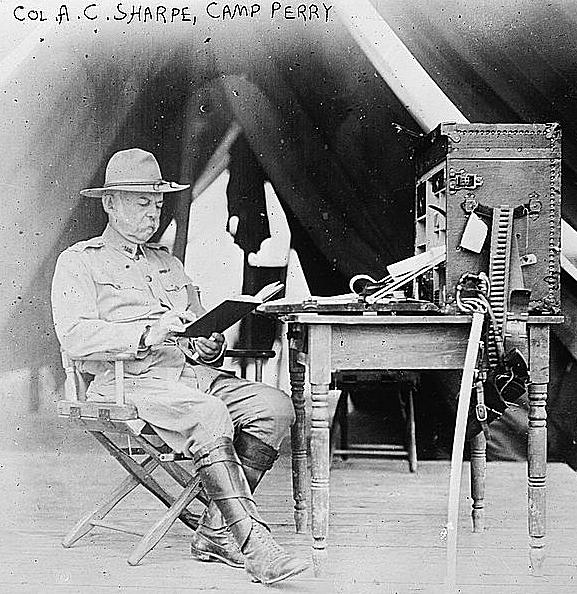
Colonel Alfred C. Sharpe at Camp Perry,
Ohio.
Note his gun belt and sword hanging from the Army issue folding
field desk
set on the non-regulation table. COL Sharpe's pistol appears to
be
one of the various models of Colt revolvers issued to the Army
1892-1903.
Photo from the Library of Congress
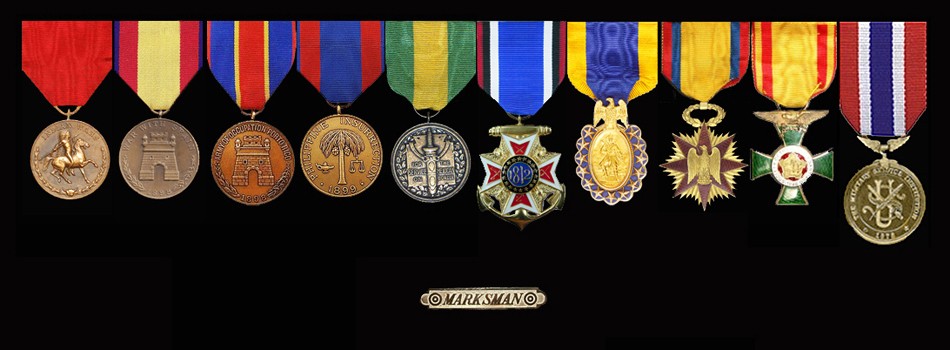
Alfred C. Sharpe's decorations
At the beginning of the Spanish
American War a large part of the US Army was encamped at Tampa,
Florida in the spring of 1898,
organizing and waiting for the upcoming invasion of Cuba. A
number of ranking officers of the Army's V Corps proposed
forming a society which in future years could commemorate the
adventure they were about to experience. After the fall of
Santiago
they joined together in that city, in the former Governor's
Palace, and formally established their Society by electing the
first officers
of their organization. Those officers were: Major General William
R. Shafter, President; Major General Joseph Wheeler,
First Vice President; and Major (of Volunteers) Alfred C. Sharpe,
Secretary. Thus, Alfred C. Sharpe became a founding member
of the Society of the Army of Santiago de Cuba.
After returning to the United
States, during their period of quarantine at Camp Wykoff, Montauk
Point, New York, the Society
was formalized by the adoption of a constitution and by-laws, and
the election of all officers provided for by that constitution.
The purpose of the society was " to record the history and
conserve the memory of the events of the campaign which resulted
in the surrender on the 17th day of July, 1898, of the Spanish
Army, the city of Santiago de Cuba and the military province
to which it pertained."
For many years the Society was
responsible for the erection of monuments and plaques in Cuba
commemorating the various
battlefields and engagements fought on Cuban soil. Many of these
still stand today.
Alfred C. Sharpe is seen in
this portrait |
An original official medal of
the Photo from the Orders and Medals Society of America |
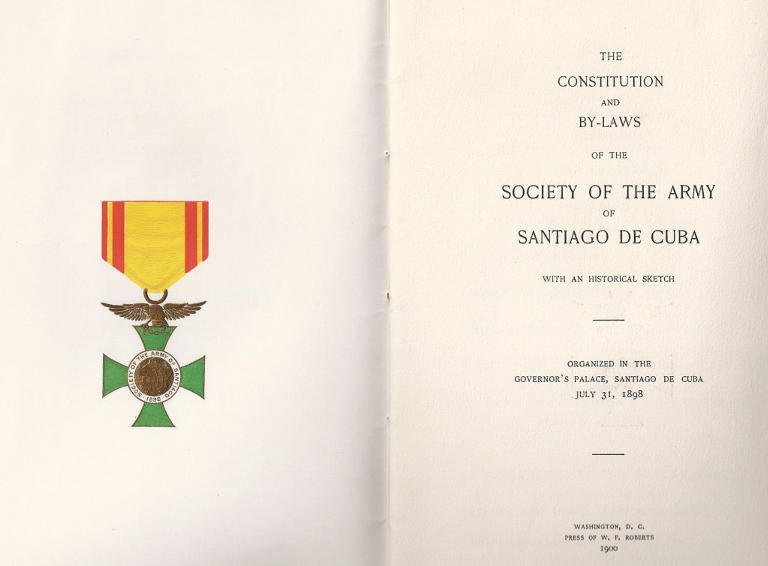
The inside cover of the Constitution of the Society of the Army of Santiago de Cuba
Photo from the Remember The Maine website
**********************
Sources:
Official US Army Registers 1872-1914
Annual Reports to the Secretary of War 1876-1912
Official Register of the Officers and Cadets of the US Military Academy 1872-1875
1 Powell's Records of Living
Officers of the United States Army
by William H. Powell
Major 22d Infantry, U.S.A.
Philadelphia: L.R. Hamersly & Co. 1890
Wooster Alumni Bulletin, Volume 3 College of Wooster, Alumni Association Published 1889
The American Almanac, Yearbook, Cyclopedia and
Atlas 1904
Published by New York American And Journal
Hearst's Chicago American and San Francisco Examiner
The
Midwestern Volume I Number 12 August 1907 published by
the Greater Des Moines Publishing Co., Des Moines, Iowa 1907
Orders and Medals Society of America
Forms part of: George Grantham Bain Collection
(Library of Congress)..
Repository: Library of Congress, Prints and Photographs Division,
Washington, D.C.
Bain News Service, publisher..
0540 USA, hdl.loc.gov/loc.pnp/pp.print.
Home | Photos | Battles & History | Current |
Rosters & Reports | Medal of Honor | Killed
in Action |
Personnel Locator | Commanders | Station
List | Campaigns |
Honors | Insignia & Memorabilia | 4-42
Artillery | Taps |
What's New | Editorial | Links |